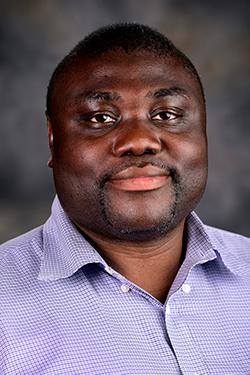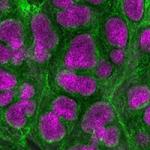
Benedict Anchang, M.Sc., Ph.D.
Investigator
Biostatistics & Computational Biology Branch
NIEHS
Research Topics
Most of Dr. Anchang’s past work focused on understanding cellular heterogeneity during normal cellular function and cancer development using mostly single-cell analysis, especially as it relates to the immune and reproductive systems. He is currently interested to improve understanding of how celltype-specific extracellular and intracellular receptors such as enzyme-linked receptors and glucocorticoid receptors are affected by drugs, endocrine disruptors, viruses, and environmental chemicals/agents. These disruptions are known to cause cancerous tumors, birth defects, neurological and other developmental disorders. Given the role of intratumor heterogeneity in drug resistance, drug combination optimization at the single-cell level is key for individualized therapy. He was able to address this computational challenge by developing a drug nested effects model (DRUG-NEM) on single-cell CyTOF drug perturbation data to examine drug combination effects that account for intratumor heterogeneity. He has also developed and published sophisticated computational tools, e.g., PHENOtypic STAte MaP (PHENOSTAMP) based on neural networks, Dynamic Spanning Forest mixtures (DSFMix) and Multiscale Multicellular Quantitative Evaluator (MMQE) to visualize protein and gene expression single-cell profiles at multiscale levels. These algorithms are particularly optimized for characterizing, benchmarking, and modeling normal and disease temporal biological processes in single-cell and multicellular systems.
Dr. Anchang recently received an award from the Chan Zuckerberg Initiative (CZI) as part of the Human Cell Atlas project to develop the first map of placental cells from women in different ethnic groups in Nigeria. The project will shed light on gene expression patterns during pregnancy and potentially reveal how genes, pathogens, age, ethnicity, and cultural activities affect fetal-maternal short and long-term health outcomes. This project will also allow Dr Anchang’s group to develop innovative, robust, and scalable methods for:
- Visualizing and modelling temporal and spatial high-dimensional single-cell data.
- Perturbation Network Analysis including optimizing drug response synergy in mixtures.
- Integration of molecular and pathological features to differentiate between chemically-induced, adverse biological processes in neoplastic and non-neoplastic lesions.
Biography
Benedict Anchang, MSc. Ph.D. is a Stadtman Tenure-Track Investigator in the Biostatistics and Computational Biology Branch. He also holds a joint appointment at the National Cancer Institute in Bethesda, Maryland. Computational biology brings order to our understanding of life, ensures the rigor and testability of biological concepts, and provides a reference map for individual insights. Anchang's Computational and Systems Biology Group performs multi-scale modeling, visualization, and integration of dynamic perturbation effects of complex biological processes, such as cancer, drug response and toxicity with personalized and precision health as a desired goal.
Selected Publications
- Egbon OA, Hickey JW, Anchang B. Fusion of spatiotemporal and network models to prioritize multiscale effects in single-cell perturbations. Brief Bioinform. 2025;26(3).
- Atitey K, Motsinger-Reif AA, Anchang B. Model-based evaluation of spatiotemporal data reduction methods with unknown ground truth through optimal visualization and interpretability metrics. Brief Bioinform. 2023;25(1).
- Anchang B, Mendez-Giraldez R, Xu X, Archer TK, Chen Q, Hu G, Plevritis SK, Motsinger-Reif AA, Li JL. Visualization, benchmarking and characterization of nested single-cell heterogeneity as dynamic forest mixtures. Brief Bioinform. 2022;23(2).
- Karacosta LG, Anchang B, Ignatiadis N, Kimmey SC, Benson JA, Shrager JB, Tibshirani R, Bendall SC, Plevritis SK. Mapping lung cancer epithelial-mesenchymal transition states and trajectories with single-cell resolution. Nat Commun. 2019;10(1):5587.
- Atitey K, Anchang B. Mathematical Modeling of Proliferative Immune Response Initiated by Interactions Between Classical Antigen-Presenting Cells Under Joint Antagonistic IL-2 and IL-4 Signaling. Front Mol Biosci. 2022;9:777390.
Related Scientific Focus Areas
This page was last updated on Friday, April 29, 2022




